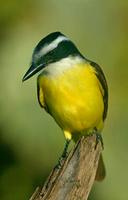|
| Query: bird | Result: 9682nd of 32685 | |
Great Kiskadee, Martin Ranch, Edinburg, TX

| Resolution: 415x650
File Size: 25289 Bytes
Upload Date: 2008:01:31 00:35:51
|
ERROR : Server Busy(-1105)
ERROR : Server Busy(-1105)
Great Kiskadee, Martin Ranch, Edinburg, TX
BIRDS AS ART BULLETIN 125
Cozad Ranch
Great Kiskadee, Martin Ranch, Edinburg, TX
Image copyright 2004, Arthur Morris/BIRDS AS ART
Canon EOS 1Ds body, Canon 500mm f/4 L IS lens with 2X TC.
I somehow wound up in Spot Metering, so this image was well underexposed at 1/500 sec. at f/11. (ISO 250) I lightened it when converting the RAW image, and then again using both Levels and Shadow/Highlight (the latter an incredible tool available only in Photoshop CS).
Many kiskadees, and an adult Sharp-shinned Hawk landed when my lens was totally fogged up... I was lucky to have more chances once the lens warmed up completely. I had kept the lens in the trunk of the car, not realizing that it would "warm up" enough to cause condensation when the sun came up. The overnight temperatures were only in the mid-forties... In similar situations in the future, I will bring the big lens into the room with me. |
^o^
Animal Pictures Archive for smart phones
^o^
|
|